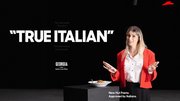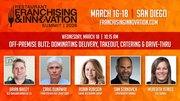Article
McDonald's prioritizing transparency to mainstream sustainability
Diners wanting to know where their food comes from has been the top trend over the past 5 to 7 years.

May 9, 2014 by Alicia Kelso — senior editor, QSRweb.com
McDonald's Global VP of CSR and Sustainability Bob Langert hosted a Twitter chat and participated in a webinar this week about the company's first-ever "2020 Corporate Social Responsibility & Sustainability Framework," released in conjunction with the company's 2012-2013 CSR & Sustainability Report. The framework, titled "Our Journey Together. For Good." features five areas of focus: Food, sourcing, planet, people and community.
The webinar was held as part of the Toronto Sustainability Speaker Series.
Langert outlined a variety of McDonald's objectives, including adding more fruits and veggies, stepping up recycling efforts and reducing the company's carbon footprint. One of the biggest hurdles in achieving these goals is getting consumers and employees 100 percent on board.
"Sustainability is a complex subject. We know consumers care, but we need to do more to connect with them about what we do," he said. McDonald's is aiming to be more transparency about its efforts, particularly through social media channels.
"Being a big, visible brand, we'll always have some critics. The key for us is to welcome and embrace transparency," Langert said.
Consumer ideas
Langert analyzed some consumer input about the sustainability topic prior to the webinar and came up with the four ideas that intrigued him the most. They include:
- Leveraging social media more."We're kind of at the beginning stages of how to leverage social media more when it comes to CSR and sustainability, including crowdsourcing," Langert said. "We haven't done anything with crowdsourcing. This intrigues me. We need more transparency. Are we perfect? No, but we do a lot of good work."
- Engaging more internally. "We're also on the surface in how we communicate with the people working in our restaurants. We're rolling out a whole new framework on CSR and getting people to understand this around the world is a challenge," Langert said. "It's top of the line for us."
- Supply chain transparency. Langert said consumers wanting to know where their food comes from has been the top trend within the past 5 to 7 years. "We're not doing much in this area, so it's ripe with opportunity," he said.
- Have a third party group share insights. Having an independent organization analyzing the "good, the bad and the ugly" will be beneficial, he said.
Working on the culture
Experts from The Corporate Social Responsibility Newswire said that 70 percent of sustainability strategies fail and most do so because the company's culture isn't pulling for its success. Langert said McDonald's is prioritizing getting everyone on board with its goals.
"Our whole philosophy is shifting at McDonald's. We're trying to identify what's most impactful as part of this shared value — doing good for society and growing the business at the same time," Langert said.
Franchisees are on board, he said, sharing some examples of their best practices, with some available online: http://mcd.md/wAFkc.
The company is also investing more in technology to collect data from its initiatives and ensure that progress is being made. The CSR team has also expanded in order to better focus on strategy, data collection, management and reporting.
"No company is sustainable unless they have the data and measurement to prove it," Langert said.
The next report from McDonald's is set to come out in Q1 2015. Langert said it will include a lot of disclosure about carbon emissions. Currently, beef makes up about 29 percent of the company's carbon footprint and McDonald's is aiming to have a verified certified beef supply by 2016.
Recycling is also a priority. In 2013, the company surveyed 34,000 restaurants with about 90 percent reporting the use of recycled cooking oil. Also, McDonald's goal is to reach 100-percent fiber-based packaging from certified or recycled sources. Currently, the company is at about 14 percent. Langert said more progress will be made once a better infrastructure is in place and when consumers are aware of these goals.
"The world is not sustainable until the consumer is engaged," he said. "Our size and scope is unique, but I believe we can help mainstream sustainability."
 ChatGPT
ChatGPT Grok
Grok Perplexity
Perplexity Claude
Claude








